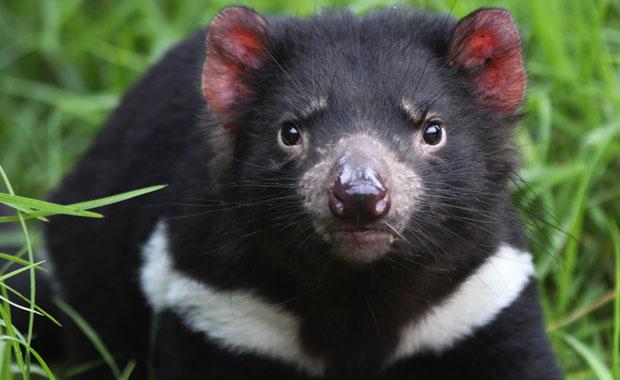|
The end of the Devil? Well, the Tasmanian devil that is. Sadly, that might well soon become a reality as a fatal contagious cancer is decimating the population of this marsupial. Found exclusively in Tasmania as their name suggests, devils, scientifically known as Sarcophilus harrisii, are small, primarily nocturnal scavengers with an unusually small amount of genetic diversity in their population.
According to a March 11th report in the Proceedings of the National Academy of Sciences, Cambridge scientists have estimated that over 70% of the Tasmanian devil population has already been killed off by this cancer that continues to rapidly spread across the central and eastern parts of the island. Since these marsupials seem to have no defensive mechanisms against this genetic invader, the fatality rate appears to be an alarming 100%. So what exactly is a contagious cancer? Quite simply, the name tells the full story: a contagious cancer is in fact a type of cancer that can spread among different individuals due to the relatively stable genome of the cancerous cells when they are transmitted. However, this disease is exceeding rare, and only a few organisms (namely dogs, hamsters, and devils) have been documented to suffer from this affliction. In dog populations however, their contagious malignancy, known as Canine Transmissible Venereal Tumor, is usually not fatal, even when no treatment is provided. Why then does Devil Facial Tumor Disease kill pretty much every individual it comes across? At first researchers thought that the answer was in the lack of genetic diversity present in the devil population. However, certain studies involving skin grafts have proven this to not be the case. Devils are usually able to successfully reject foreign cells. Now, progress has been made with the understanding that the difference is one of cancer recognition. While the immune systems of dogs are able to identify the foreign cells and respond to them, the cancer that spreads among Tasmanian devils appears to turn off the production of proteins that typically accomplish identification. As such, the animals cannot recognize the invading cells as being different from their own and therefore produce no immune response. By turning off the major histocompatibility genes (MHC genes), the invading cells become indistinguishable from those of the animal itself. Without a swift human response, the devils from down under don’t stand a chance. The new findings as to how the cancer is able to spread so effectively are, however, a promising step towards dealing with this disease. University of Cambridge geneticist Elizabeth Murchison is hopeful as she explains, “It’s really the first hope that there could be a vaccine or immune therapy.” One possible solution would be to turn on the MHC genes in order to give the immune system a fighting chance against the cancer. Lab studies have already shown that an anti-fungal drug known as Trichostatin A might be able to activate the MHC genes by effecting gene activity. Other positive results have also been achieved with interferon gamma, a genetic chemical that seems to have the same effect. Such studies, however, are very introductory and a possible vaccine or inoculation against the contagious cancer is still long in the making. It remains to be seen whether the Tasmanian Devil populations will have that long to live.
0 Comments
Leave a Reply. |
Categories
All
Archives
April 2024
|

